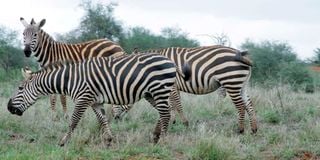Premium
Tsavo National Park through the eyes of Obama

A herd of Zebra graze at Tsavo West National Park in Taita Taveta County in this photo taken on December 15, 2021.
What you need to know:
- Producers of the documentary said they had 33 expeditions of 10 countries in five continents, filming for over 1,500 days.
- They were also working with a number of people in each country, which allowed them to minimise on air travel.
The new Netflix docuseries Our Great National Parks takes viewers to national parks around the world, from the Chilean Patagonia to Kenya’s Tsavo East National Park to the soothing narration of one of the show’s executive producers, former US President Barack Obama.
If you’ve ever been to Kilaguni Serena Safari Lodge and taken a tour with them or you’ve been longing to savour travel sights and sounds particularly after two years of Covid-19-linked lockdown, then view this inviting unveiling of ravishingly varied landscapes, seascapes, and surprising animal escapades.
Many of the locations featured in the series were selected because of Obama’s personal connection to the parks and this is clear when he introduces Kenya’s biggest national park.
“The first time I visited Kenya, about 30 years ago, I was a stranger,” says Obama. “This was the land of my father, who had passed away and whom I barely knew. But I had met my family. I visited the village that they came from. I felt welcomed everywhere. And as my sister and I spent a few days on safari, I felt something else: awe. The African bush...swept on forever with wide-open skies and wildlife that never seemed to end. What a gift to see the world anew, to see the place where ultimately all of us come from.”
Joanne Scofield, the producer-cum-director of the third episode that is about Tsavo, remarks that “super tuskers are super elusive”.
Images in Africa
“There are only 30 or so of these enormous, iconic elephants left in Africa and Tsavo is home to a third of them. But finding one in such a vast area is no easy task. With the support of the Tsavo Trust and the Kenyan Wildlife Service, we were fortunate enough to seek out and film one of the oldest bulls. We spent an entire day with him as he swaggered between waterholes, checking out the herds. He even fell asleep for an hour leaning on his gigantic tusks! It was an honour to accompany him through the bush and spend time in his huge presence,” he said.
According to Henrietta Karimi, the manager of Serena Lodge, the crew camped at her hotel for months. She added that they even had to convert one of the rooms into a studio.
“We knew they were filming something important because of the equipment they had. But we didn’t know it was a documentary that was to be narrated by Obama. We wish he had also visited us,” she said.
In the documentary, Obama says in his baritone voice: “The sight of dust-red elephant wallowing, rolling and spraying each other with the midnight blue waters of palm-shaded Galana River is one of the most evocative images in Africa.”
He goes on: “This, along with the 300-kilometre-long Yatta Plateau, the longest lava flow in the world, make for an adventure unlike any other in the Tsavo East.”
Protected area
The park forms the largest protected area in Kenya and is home to most of the largest mammals on the planet.
Producers of the documentary said they had 33 expeditions of 10 countries in five continents, filming for over 1,500 days.
They were also working with a number of people in each country, which not only allowed them to minimise on air travel but it also helped them when the pandemic hit.
“We were relying on people in-country and they were giving us such a unique and rare perspective of their national parks because, of course, to them, they’re their backyards. They’re the places that they’re the most connected to,” said executive producer James Honeyborne.
The documentary is currently streaming on Netflix.





